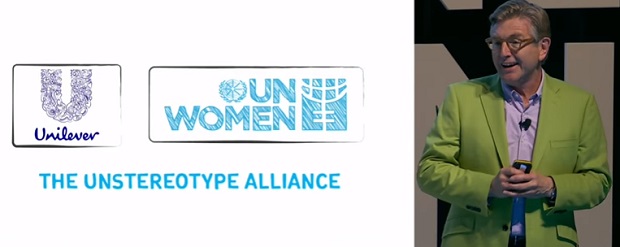Diversity was a key topic as this year’s Cannes Lions Festival, with Unilever chief marketing and communications officer Keith Weed leading the way with an “#unsterotype” initiative and warnings about how brands need to avoid association with extremist content online.

During the festival, Weed took part in a series of talks and media interviews today to press home his key areas of interest, ranging from brand safety and the digital supply chain through to sustainability and diversity.
The high-profile marketing chief, a regular attendee to Cannes Lions, started the day speaking at a brand safety event hosted by the Wall Street Journal.
Weed argued that its high safeguards in digital media buying meant that the consumer goods giant did not have to pull spend from YouTube following The Times’ investigations that found some brands were funding extremist content.
Some brands were quick to pull up Google for bad practice but Weed took a different approach, instead speaking to the tech giant about the problems and found that there were one or two human errors.
He said: “I think media companies and advertisers have a responsibility to be doing the best job in buying the right media. [With] programmatic if you don’t run a tight desk then you will drive towards getting the cheapest spot – on a lower brow site.”
When asked whether the response from brands was overblown, Weed said: “It’s up to them, I think everyone was quick to say ‘bad YouTube, bad Google’. Others said, ‘am I buying media as I should?’.
Weed and Baker’s conversation was wide-ranging, showing just how broad the CMO’s purview has become. The discussion covered sustainability initiatives, media buying (and the Google/ Facebook duopoly), being “mass market” in a polarized world, and handing power over to local marketers.
These big issues weren’t solved over the course of the conversation, but it showed one of the world’s biggest advertisers has clear ideas on how to navigate the difficult terrain ahead.
When it comes to measurement, Weed said he wants greater agreement in the industry about what constitutes a “view” in digital advertising, which he unequivocally says should be 100% of the pixels in an ad.
#unsterotype initiative
Last year in Cannes, Unilever called for an end to gender stereotyping in advertising with the launch of “#unstereotype.”
This year, with UN Women, it’s leading an alliance that includes Mars, Microsoft, J&J, Mattel, P&G, WPP, Google and many other companies.
The “Unstereotype Alliance” will develop a measurement system and set some goals, allowing it to chart progress and reconvene next year.
Unilever’s research found only 3% of ads showed women in clear leadership positions; only 2% of women appeared intelligent; and only 1% showed a sense of humour. It also found that “progressive ads” without the “lazy short-hands” about gender roles were 25% more effective, Weed said.
“I think if we hold a mirror to the industry, we’ll start taking this more seriously,” he said.
